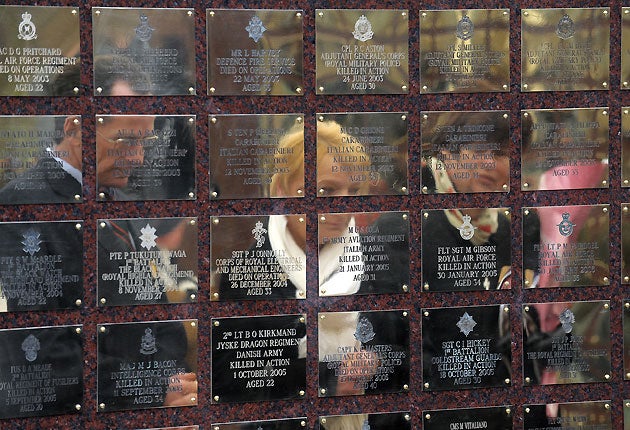A momentous day for relatives of the Iraq fallen

Your support helps us to tell the story
From reproductive rights to climate change to Big Tech, The Independent is on the ground when the story is developing. Whether it's investigating the financials of Elon Musk's pro-Trump PAC or producing our latest documentary, 'The A Word', which shines a light on the American women fighting for reproductive rights, we know how important it is to parse out the facts from the messaging.
At such a critical moment in US history, we need reporters on the ground. Your donation allows us to keep sending journalists to speak to both sides of the story.
The Independent is trusted by Americans across the entire political spectrum. And unlike many other quality news outlets, we choose not to lock Americans out of our reporting and analysis with paywalls. We believe quality journalism should be available to everyone, paid for by those who can afford it.
Your support makes all the difference.As The Last Post sounded, the wind that had buffeted the National Memorial Arboretum suddenly dropped and the billowing flags hung forlornly as heads were bowed in silence.
Wave after wave of the families of those who perished in Iraq moved forward solemnly to place their own flowery tributes at the newly rededicated Basra Memorial, the infirm assisted by younger arms.
For a few minutes they crowded around, urgent eyes scanning the gleaming brass plaques set in regimented rows on the brick red granite, looking for their son, daughter, husband or wife. Some sobbed openly as they placed their fingers delicately on the inscription they found.
Today beneath the elegant and imposing national memorial in Staffordshire to those who have lost their lives in conflicts since the Second World War, a smaller wall was rededicated. It was the memorial that the soldiers had built for their fallen comrades in Basra, dismantled at the end of Operation Telic combat operations last year and brought back to Britain.
The central marble tablet, dedicated at the St Paul’s Cathedral commemoration service last year reads: “Honourable age does not depend on length of days, nor is the number of years a true measure of life.”
The conflict may be consigned to history but the searing grief of the families, almost 500 of which gathered for the ceremony yesterday, was still fresh. On a day when five soldiers were repatriated from Afghanistan and two more were buried, it was a moment to remember earlier sacrifices from another war.
Staring at his son’s plaque, Dany Wysoczan struggled to express his emotions. “It hurts,” he said simply. Private Johnathon Wysoczan of the Staffordshire Regiment, 21, died days after being shot by a sniper in 2007. His father added haltingly: “It is fantastic but I am here for the wrong reasons, because I have lost my son,”
“It is gorgeous,” said Carol Jones, who lost her son Sergeant John Jones, 31, of the Royal Regiment of Fusiliers, to a bomb in late 2005. “When they played the Last Post, four and half years of tears just came out.”
The Prime Minister Gordon Brown as well as the leaders of the other parties, the Chief of the Defence Staff Sir Jock Stirrup and the Duke of Gloucester sat in the front row of a short poignant service yesterday over which flew a formation of RAF Tornados.
A note with Mr Brown's wreath read: "Each one a hero, who put country before comfort, service before self and liberty before life, a grateful nation will never forget."
Nervously Tracey Hazel, whose son Corporal Ben Leaning, 24, of The Queen’s Royal Lancers, was killed on 19 April 2007, battled against the wind and damp to light a candle at the base of memorial – which has a plaque for each of the 179 Brits who died as well as soldiers from other nations who perished fighting alongside them.
“It was really emotional. I never ever thought I would see the wall in my life time,” she explained. “I saw a photograph of it (in Basra) and spent hours to see if I could find Ben’s plaque. I knew he was the 143rd. I am really grateful to those who campaigned to bring it home.”
In a week when Mr Brown was accused of starving the armed forces before the Chilcot Inquiry and using a visit to troops in Afghanistan as a political stunt, his presence yesterday divided opinion. While several insisted they remained grateful for his assistance in bringing back the memorial others felt the seats he and his fellow politicians had taken at the service could have been better filled by family. Most, however, seemed oblivious to his presence, insisting the day was not for political posturing but for dignified remembrance.
For the families who fought to have the memorial brought home for fear that it would fall into ruins in Iraq, it was a momentous day.
“There is the national memorial but this is the military one. This was the one made by the boys for the boys,” explained Roger Bacon, whose son Major Matthew Bacon, 34, of the Intelligence Corps was killed by a roadside bomb in 2005.
Former Sergeant Major Matt Graves recalled the two weeks his men from the Royal Engineers spent making the original wall in 2006. At the height of the battles in Basra in Operation Sinbad, they spent their spare time – often clad in body armour and helmet because the base was regularly mortared – building the wall at night. Three times he told them to take it down and start again.
“They knew this had to be right. The night we finished it we all stood back and had a quiet little moment. There was an overwhelming sense of pride that it was something that was going to last. It was for our fallen comrades.”
Join our commenting forum
Join thought-provoking conversations, follow other Independent readers and see their replies
Comments